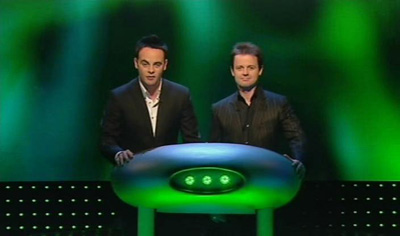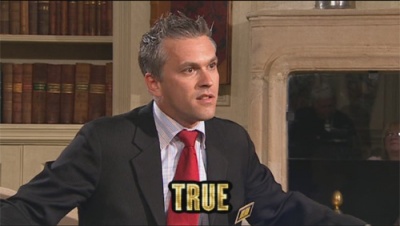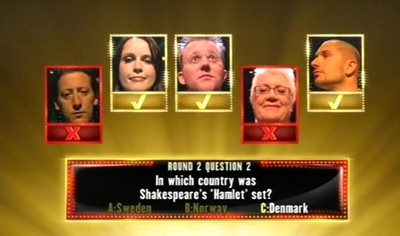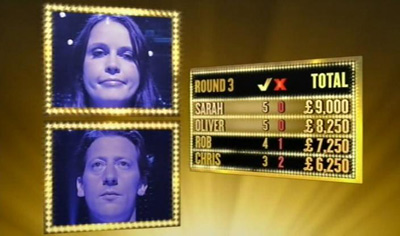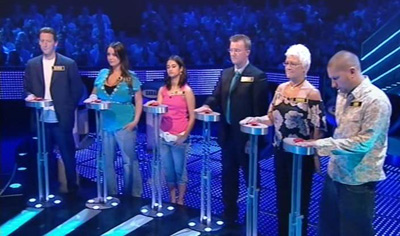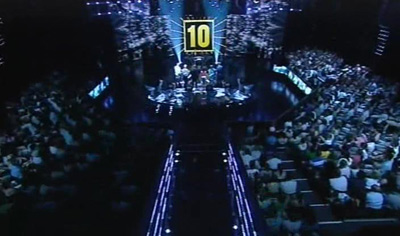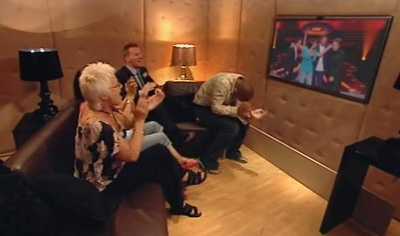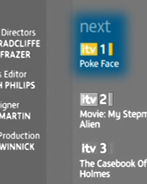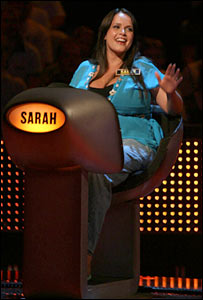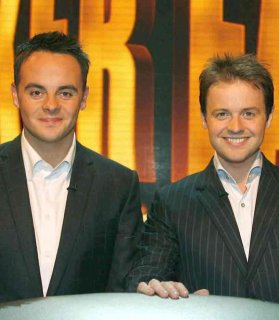PokerFace
Contents |
Host
Co-hosts
Voiceover: Tim Caple
Broadcast
TalkbackThames in association with Gallowgate for ITV1, 10 July 2006 to 3 March 2007 (14 episodes in 2 series)
Synopsis
Ant and Dec invite 36 people to their Arena of Quiz in order to give £1m to one of them. Six people in each heat, the winner of each heat wins £50,000 stake money for the grand final where the winner wins a million.
The titles are doomy and orangey. The arena is large and electronicy. Our hosts are short and Geordie. And we're introduced to the evening's players via "The Grilling" - some pre-show footage of the contestants telling each other about themselves... or not! They can, if they wish, invent a completely fictitious back story about themselves. Nicely, a little graphic showing "true" or "bluff" comes up with each fact the players reveal about themselves. Right from the outset, the show is seen to be about lying, but for reasons we're going to get to later, perhaps it shouldn't be the case.
Each contestant is in the studio now in front of their own little monitor and answer buttons. They are sitting in a line (so they can't really see other contestants' reactions to right answers, which we think is a wasted opportunity). They can see how well they're doing, but crucially can't see how well anybody else is doing. In the first round everyone gets eight questions (five in subsequent rounds) - throughout the show these are all multiple choice with a choice of three options. In round one each question is worth £500, increasing by £250 in each round. Scores are cumulative. We know who got each question right because a graphic comes up with all the contestants' faces alongside a tick or a cross - to be honest, with the question in shot also, it feels like there's quite a lot to take in with a single graphic here.
After each round of questions, the voiceover gives us a very Weakest Link-esque run down on the round's stats and a scoreboard pops up, showing the amount of right and wrong answers in the round and each player's cumulative cash totals. The commentary is well honed, both accurate and relevant.
Ant and Dec now banter with of the players to try and eke out how well they think they've done. The players, of course, need to make out that they've done pretty well. Eventually it leads to players beginning to belittle their opponents, which is actually more fun than the Ant and Dec contestant banter, as it turns out.
Now we're at the end of the round, the exciting red folding buttons rise out of the ground, so the players have to get up and walk on over to them. They now have one last chance to throw some choice words, and then a ten second countdown begins (in very large numerals on the giant screen in front of them). If someone pushes the button before the countdown hits zero, they eliminate themselves BUT get to keep any cash they've made up to that point.
If nobody folds, then the person with the least amount of cash is eliminated and gets absolutely zip for their trouble - as you can work out, the further through the game they get, the more money is at risk. This is more interesting than the players bluffing about how well they've done is when they start to use persuasion on each other to leave the game. How much do they need the money after all? People who fold when they should have stayed on are said to have been "Pokerfaced", which is, to be honest, a really rubbish verb.
The eliminated player goes to a posh green room with Ant or Dec to "do" a post game interview. It's also revealed to them whether they were right to fold, or indeed how wrong they were not to. Repeat until one person remains standing who wins £50,000 stakemoney for the final.
The commercial breaks are placed rather awkwardly, with seemingly no rhyme or reason as to when they appear. On occasion, there's a very silly decision to hide the reveal as to who should have folded until after the break, when we as the audience are already privy to the result. It's quite interesting how the the reveal is stretched out in this way - we know what happens before the contestants do, giving us two money shots. One is the contestants backstage reacting to what's happened, and the other is watching the faces of the finalists when we've seen one of them lose up to £75,000 - which, let's be honest, is possibly more interesting than the other winning a million.
There's something not quite right about the beginning - few people are going to back out in the early rounds where the money on the line isn't too high, which rather makes a mockery of the bluffing aspect the show appears to be basing itself around. Perhaps giving everyone a few extra quid to start with would help.
However, let's look at the positives here. We've a very well produced quiz on ITV! Who'd have thunk it? The graphics are good, the set's good, the hosts are good, and special mention to the fantastic questions - well written, accurate and plenty hard to ensure that there's enough doubt in your mind about how well you're doing. The £1million final worked very well, with some decidedly jittery contestants not wanting to lose their £50k.
It's not the new Millionaire, but after so many years of so-so entertainment, ITV finally have a hit.
Series Two
Excitingly, it looks like they've taken some of the criticisms on board. Contestants now begin with £1,000 in stake money to make the first round decision a bit more interesting (and it does as well), and when they're down to three players all the fold buttons are on the same plinth, so the players can look each other in the eye. The show is now weekly.
We still think it would be a good idea if the players had a decent view of each other's faces as they answer the questions seeing that is the main tenet the show has built itself around (having the contestants sit in the round would look unwieldly on that set, but how hard would it be to relay the cameras pointing at each player to each individual's screen?). But it's still a very entertaining show, so its difficult to complain too much really.
Catchphrases
"You've lost your place on PokerFace!"
"You were PokerFaced!"
"Is it you? Is it you? It's one of you..."
Inventor
Ant McPartlin and Declan Donnelly. In a pub in 2004, allegedly.
Theme music
Paul Farrer
Trivia
This format was piloted as PokerFace but officially announced as The Con.Test before reverting to the original title. Presumably they changed it in case people thought it was a poker show, then decided it wasn't that big a problem after all when Australia made their own version in 2007.
The ITV1 bumper graphic before the Wednesday episode helpfully decided to retitle the show Poke Face.
Voted the Best New Show in this site's Poll of 2006
In the series two final, the climactic face-off was extended to 15 seconds instead of the usual 10.
Champions
| 2006 | Sarah Lang |
| 2007 | Dominic Jackson |
Merchandise
A board game version was produced for Marks & Spencer.


